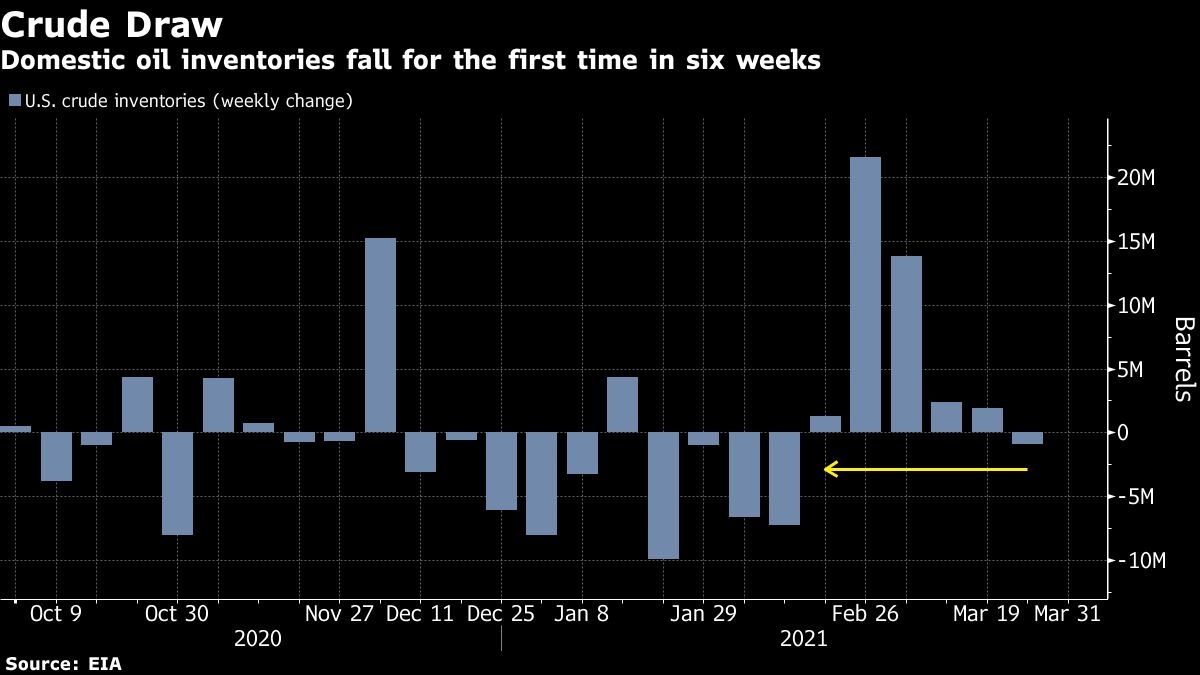Mar 30, 2021
Oil slides after OPEC+ panel ends with no policy recommendation
, Bloomberg News
Oil fell after an OPEC+ panel meeting ended without an oil policy recommendation.
Futures in New York slipped after earlier rising as much as 1 per cent on Wednesday. A gathering among producers ended without any recommendations on output, according to delegates. In the run-up to Thursday’s talks, OPEC Secretary-General Mohammad Barkindo pointed to the oil market’s recent volatility as “a reminder of the fragility facing economies and oil demand.”
The OPEC+ alliance is debating whether to revive part of the 8 million barrels of daily output -- about 8 per cent of global supply -- they’re withholding. After surprising traders at the last session by not easing curbs, the group had been expected to maintain that position.

Meanwhile, figures from an Energy Information Administration report paint the U.S. as a bright spot in the demand recovery. U.S. refineries are getting back to work after a spate of outages caused by February’s deep freeze, processing crude at the highest rate in a year. In other parts of the world, consumption remains spotty. In Europe, France is leaning toward a national lockdown, further signaling how the pandemic is preventing a full-fledged demand rebound.
“The demand numbers were huge and we continue to see improvements there,” said Matt Sallee, portfolio manager at Tortoise, a firm that manages roughly US$8 billion in energy-related assets. “It’s pretty consensus to think that gasoline will be strong and jet fuel will be the laggard,” but there’s been positive signs “even on the jet fuel side.”
Prices:
- West Texas Intermediate for May delivery fell 36 cents to US$60.19 a barrel at 1:34 p.m. in New York
- Brent for May settlement slipped 40 cents to US$63.74 a barrel ahead of the contract’s expiry later on Wednesday
Brent for June delivery lost 56 cents to US$63.61 a barrel
“The balance of risks suggests OPEC will steer toward the cautious outcome, delivering sharp deficits and continue to tighten energy markets at a fast clip,” TD Securities commodity strategists led by Bart Melek said in a note.
At the same time, Saudi Aramco, the state-owned oil giant, is expected to raise its Arab Light official selling price for May supplies by 30 cents a barrel, according to the median estimate in a Bloomberg survey of refiners and traders. That’s despite continued flows of Iranian crude into China, and challenging conditions for many Asian refiners.
Related news:
- The Suez Canal crisis has benefited suppliers of fuel to the ships that chose to avoid the waterway and sail the long way around Africa. At the port of Durban, the price of very low sulfur fuel oil has surged 20 per cent since March 22, according to Cockett Marine data.
- The Saudi crown prince’s late-night announcement that Aramco could reduce payouts to the state will potentially alleviate the strain on the oil giant’s balance sheet.
- Libya’s energy industry is on track to get enough money from the government for the OPEC member to sustain its crude production throughout the year, according to the new oil and gas minister.
--With assistance from Alex Longley.




